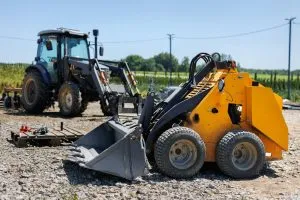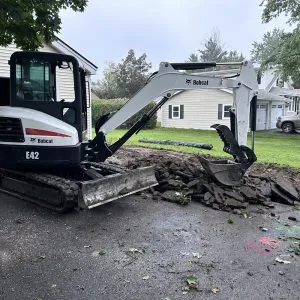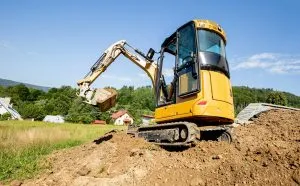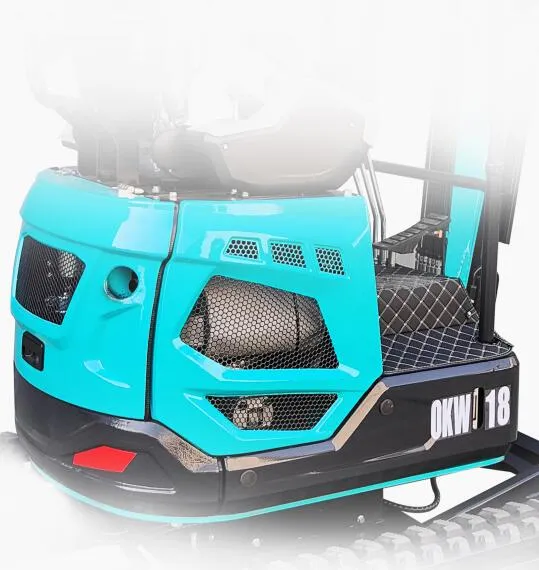Mini excavators have become essential machines in various construction, landscaping, and utility projects. Their compact size allows them to access tight spaces where larger equipment can’t go, but don’t be fooled by their smaller stature—they can still perform a wide range of tasks, including excavation. One of the most frequently asked questions about these versatile machines is, “How deep can a mini excavator dig?”
In this article, we’ll explore the factors that determine how deep a mini excavator can dig, different models’ digging capabilities, and some practical considerations for selecting the right excavator for your specific needs.

Understanding Mini Excavator Capabilities
To answer the question of how deep a mini excavator can dig, it’s important first to understand what exactly a mini excavator is and how it functions.
A mini excavator is a smaller version of a standard excavator, usually weighing between 1 to 10 tons. Despite its compact size, it operates with an articulated arm, a boom, and a bucket that work together to excavate soil and debris. This combination of components, along with the machine’s engine power and hydraulic systems, determines the digging depth.
Average Digging Depths of Mini Excavators
The digging depth of a mini excavator typically depends on its size and model. Below is an average estimate of how deep mini excavators of different sizes can dig:
- 1-2 ton mini excavators: These are the smallest models available. They are often used for light work in residential areas or confined spaces. Typically, this size of mini excavator can dig to a depth of 5 to 8 feet.
- 2-4 ton mini excavators: These medium-sized mini excavators are more versatile and can handle larger jobs while still being small enough to work in tight areas. On average, these excavators can dig to a depth of 8 to 10 feet.
- 5-6 ton mini excavators: This range offers a great balance of power and portability. Mini excavators in this class can dig to depths of 10 to 12 feet, which makes them suitable for more complex tasks, such as trenching and foundation excavation.
- 7-10 ton mini excavators: The largest mini excavators available are typically capable of digging to depths of 12 to 15 feet. These machines are still small enough to maneuver in tight spaces but have the strength to handle heavy-duty projects.
It’s important to note that these figures represent average digging depths and can vary depending on the specific model and manufacturer.

Key Factors Affecting Digging Depth
While the weight and size of the mini excavator largely determine how deep it can dig, there are several other factors that can influence its performance.
1. Arm and Boom Length
The design of the excavator’s boom and arm is one of the primary factors affecting its digging depth. Mini excavators come with different boom and arm configurations, which allow operators to extend their reach. Long-reach arms can increase digging depth significantly, although they may reduce the overall stability of the machine.
2. Bucket Size
The size of the bucket can also impact digging depth. A larger bucket may allow for more material to be moved at once, but it can also place more strain on the boom and arm, potentially reducing the digging depth that can be achieved. Conversely, smaller buckets can be more precise but may require more passes to achieve the desired depth.
3. Hydraulic Power
Mini excavators rely on hydraulic systems to move the boom, arm, and bucket. The strength of these hydraulic systems will directly affect how efficiently the machine can dig. A more powerful hydraulic system allows the excavator to dig deeper and with more force, even in tougher soil conditions.
4. Terrain and Soil Type
The type of soil you’re working with can greatly influence the depth that a mini excavator can achieve. Loose, sandy soil is easier to excavate and may allow the machine to reach its maximum digging depth. However, dense, rocky, or clay-heavy soils can make it more difficult for the machine to dig as deeply.
5. Operator Skill
Finally, the experience and skill of the operator can make a big difference in how efficiently a mini excavator digs. An experienced operator will know how to adjust the machine’s controls to maximize digging depth while maintaining the excavator’s stability and avoiding unnecessary wear and tear on the equipment.

Applications Requiring Maximum Digging Depth
Mini excavators are used in a variety of industries for projects that require digging. Some common applications where maximum digging depth is crucial include:
- Trenching for Utilities: Utility companies often use mini excavators to dig trenches for pipes, cables, and drainage systems. For these projects, the ability to dig to a consistent depth is essential.
- Foundation Excavation: When preparing the ground for a new structure, mini excavators are often used to dig foundations. In these cases, the depth of the foundation needs to be precise to ensure structural integrity.
- Landscaping: In landscaping projects, mini excavators are used to dig for retaining walls, ponds, and other features that require precise depth control.
- Road and Sidewalk Construction: For smaller-scale roadwork or sidewalk installations, mini excavators provide the necessary power and precision to dig through asphalt or other tough materials.
How to Choose the Right Mini Excavator for Your Digging Depth Requirements
When selecting a mini excavator for a specific job, you’ll need to consider several factors to ensure the machine can achieve the necessary digging depth.
1. Job Site Size
If you’re working in a confined space, a smaller mini excavator will be more practical. However, if your project requires deeper excavation, you may need to opt for a larger model, even if it means sacrificing some maneuverability.
2. Depth Requirements
Make sure the mini excavator you select can dig to the required depth for your project. Refer to the manufacturer’s specifications to ensure the model you choose has the appropriate arm and boom reach.
3. Attachments
Consider whether you need any additional attachments to increase your machine’s versatility. For instance, long-reach arms or specific buckets can help you achieve the necessary digging depth.
4. Brand and Model
Different brands offer different features and capabilities. Well-known brands such as Nicosail are highly regarded for producing mini excavators that deliver exceptional digging depth, power, and reliability.

Advantages of Mini Excavators for Deep Digging Projects
Mini excavators offer several key advantages over larger machines when it comes to deep digging:
- Compact Size: Their small size allows them to access confined spaces that larger machines can’t reach, making them ideal for urban areas or sites with limited space.
- Ease of Transport: Mini excavators are easier to transport than full-sized models, which can reduce costs and time when moving between job sites.
- Versatility: These machines can be equipped with a variety of attachments to handle different tasks, from digging to demolition and grading.
- Lower Operating Costs: Mini excavators generally consume less fuel and are more affordable to rent or purchase than larger models.
Nicosail: A Top Choice for Mini Excavators
When it comes to selecting a mini excavator for your deep digging projects, Nicosail stands out as a brand known for its quality, performance, and innovation. Nicosail’s range of mini excavators offers impressive digging capabilities, with models that can achieve deep excavations while maintaining maneuverability and power. Whether you need a machine for light landscaping or a more demanding excavation project, Nicosail has a solution that can meet your needs.
Their excavators are built with durable materials, advanced hydraulic systems, and ergonomic controls, ensuring that you can get the job done efficiently and effectively. Plus, with a focus on customer satisfaction and after-sales service, Nicosail provides excellent support, making them a reliable choice for contractors and construction professionals alike.
Conclusion
Mini excavators are versatile machines capable of digging to impressive depths, with models ranging from 1-ton to 10-ton capable of reaching depths between 5 and 15 feet. The actual depth will depend on several factors, including the model, hydraulic power, and terrain. For anyone in the market for a reliable mini excavator that can handle deep digging, Nicosail offers top-tier models that deliver excellent performance, power, and longevity.







